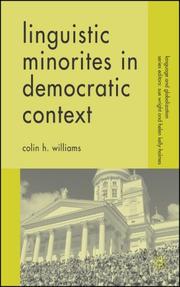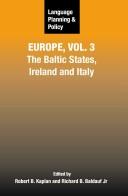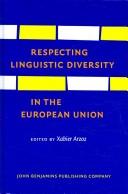| Listing 1 - 10 of 38 | << page >> |
Sort by
|
Book
ISBN: 9782296058392 2296058396 Year: 2008 Publisher: Paris: L'Harmattan,
Abstract | Keywords | Export | Availability | Bookmark
 Loading...
Loading...Choose an application
- Reference Manager
- EndNote
- RefWorks (Direct export to RefWorks)
Language policy --- Multilingualism --- Europe
Book
ISBN: 9783110205831 9783110205848 3110205831 311020584X Year: 2008 Volume: 23 Publisher: Berlin Mouton de Gruyter
Abstract | Keywords | Export | Availability | Bookmark
 Loading...
Loading...Choose an application
- Reference Manager
- EndNote
- RefWorks (Direct export to RefWorks)
Sociolinguistics --- Linguistic minorities --- United Nations --- Language policy

ISBN: 9781403987211 1403987211 Year: 2008 Publisher: Basingstoke: Palgrave MacMillan,
Abstract | Keywords | Export | Availability | Bookmark
 Loading...
Loading...Choose an application
- Reference Manager
- EndNote
- RefWorks (Direct export to RefWorks)
Language and languages --- Language policy. --- Linguistic minorities. --- Political aspects.
Book
Year: 2008 Volume: 5280 Publisher: Paris : La Documentation française,
Abstract | Keywords | Export | Availability | Bookmark
 Loading...
Loading...Choose an application
- Reference Manager
- EndNote
- RefWorks (Direct export to RefWorks)
Sociolinguistics --- Language policy --- Sociolinguistique --- Politique linguistique --- Europe --- Europe --- Languages --- Langues


ISBN: 9782762128130 9782762128932 Year: 2008 Publisher: Montréal Fides
Abstract | Keywords | Export | Availability | Bookmark
 Loading...
Loading...Choose an application
- Reference Manager
- EndNote
- RefWorks (Direct export to RefWorks)
French language --- Language policy --- Political aspects --- History --- Usage


ISBN: 1281725773 9786611725778 1847690297 9781847690296 9781847690289 1847690289 1847690289 Year: 2008 Publisher: Bristol Blue Ridge Summit
Abstract | Keywords | Export | Availability | Bookmark
 Loading...
Loading...Choose an application
- Reference Manager
- EndNote
- RefWorks (Direct export to RefWorks)
This volume covers the language situation in The Baltic States, Ireland and Italy explaining the linguistic diversity, the historical and political contexts and the current language situation, including language-in-education planning, the role of the media, the role of religion, and the roles of non-indigenous languages. The authors are indigenous and/or have been participants in the language planning context, and these monographs on the Baltic States, Ireland, and Italy draw together the published literature in each of these polities. The purpose of the volumes in this series is to present up-to-date information on polities that are not well-known to researchers in the field. A longer range purpose is to collect comparable information on as many polities as possible in order to facilitate the development of a richer theory to guide language policy and planning in other polities that undertake the development of a national policy on languages. This volume is part of an areal series which is committed to providing descriptions of language planning and policy in countries around the world.
Language planning -- Europe. --- Language planning. --- Language policy -- Europe. --- Languages & Literatures --- Philology & Linguistics --- Baltic states. --- Ireland. --- Italy. --- language planning. --- language policy. --- linguistic diversity. --- non-indigenous languages.

ISBN: 1282152009 9786612152009 9027291322 9789027291325 9789027228338 9027228337 Year: 2008 Publisher: Amsterdam ; Philadelphia : J. Benjamins Pub. Co.
Abstract | Keywords | Export | Availability | Bookmark
 Loading...
Loading...Choose an application
- Reference Manager
- EndNote
- RefWorks (Direct export to RefWorks)
After the accession of ten new member-states in 2004, the number of official EU languages increased from eleven to twenty. In 2005, the Council of the European Union decided to expand the existing legal framework for Irish and for other languages, such as Basque, Catalan and Galician, which are official in all or part of the territory of a given member-state. On 1 January 2007 Bulgaria and Romania joined the EU, increasing the number of official EU languages still further. This book addresses the challenge of respecting linguistic diversity within the EU and is intended as an introduction to the issue for those not already familiar with EU law. It also provides an analysis of the potential of the Charter of Fundamental Rights of the European Union to enhance respect for linguistic diversity. Each chapter has been written by a recognised expert in the field. The appendices bring together the basic legal norms relating to linguistic diversity within EU institutions.
Multilingualism --- Language policy --- European Union. --- E.U. --- Communication policy --- Language planning --- Language and languages
Book
ISBN: 9783836475242 3836475243 Year: 2008 Publisher: Saarbrücken VDM Verlag
Abstract | Keywords | Export | Availability | Bookmark
 Loading...
Loading...Choose an application
- Reference Manager
- EndNote
- RefWorks (Direct export to RefWorks)
Language policy --- Bilingualism --- Sociolinguistics --- Language and languages --- French language --- German language --- Political aspects --- Belgium --- Languages --- History.
Book
ISBN: 9783110205138 9783110205121 3110205130 3110205122 9786613428653 1283428652 3110208350 Year: 2008 Volume: 96 Publisher: Berlin Mouton de Gruyter
Abstract | Keywords | Export | Availability | Bookmark
 Loading...
Loading...Choose an application
- Reference Manager
- EndNote
- RefWorks (Direct export to RefWorks)
This book offers an inclusive perspective on the constellation of languages in Europe by taking into account official state languages, regional minority languages and immigrant minority languages. Although "celebrating linguistic diversity" is one of the key propositions in the European discourse on multilingualism and language policies, this device holds for these three types of languages in a decreasing order. All three types of languages, however, are constituent parts of a multilingual European identity and should be taken into account in any type of language policy. Both facts and policies on multilingualism and plurilingual education are addressed in case studies at the national and European level. The selection of case studies is based on a careful weighing of geographical spread of countries and languages across Europe on the one hand, and availability of established expert knowledge on the other. After an Introduction to the theme of the book (Guus Extra and Durk Gorter), Part I deals with official state languages with a focus on the spread of English as lingua franca across Europe (Juliane House), on French and France (Dennis Ager), on Polish in Poland and abroad (Justyna Lesniewśka), and on language constellations in the Baltic States (Gabrielle Hogan-Brun). Part II deals with regional minority languages with a focus on Catalan in Spain (Francesc Xavier Vila i Moreno), Frisian in the Netherlands (Durk Gorter et al.), Hungarian as a minority language in Central Europe (Susan Gal), and Saami in the Nordic countries (Mikael Svonni). Part III deals with immigrant minority languages in the United Kingdom (Viv Edwards), Sweden (Lilian Nygren-Junkin), Italy (Monica Barni and Carla Bagna) and Europe at large (Guus Extra and Kutlay Yağmur).
Sociolinguistics --- Europe --- Multilingualism --- Multilinguisme --- Linguistics minorities --- Language and languages --- Multilingualism - Europe --- Linguistics minorities - Europe --- Language Policy. --- Linguistic Diversity. --- Sociolinguistics.
Book
ISBN: 9781595583505 1595583505 1282644424 1595585842 9786612644429 Year: 2008 Publisher: New York The New Press
Abstract | Keywords | Export | Availability | Bookmark
 Loading...
Loading...Choose an application
- Reference Manager
- EndNote
- RefWorks (Direct export to RefWorks)
"At a time when children are written off in our schools because they do not speak formal English, and when the class- and race-biased language used to describe those children determines their fate,The Skin That We Speakoffers a cutting-edge look at crucial educational issues. Now reissued with a new introduction by Lisa Delpit revisiting the politics of language instruction for students of color,The Skin That We Speaktakes the discussion of language in the classroom beyond the highly charged war of idioms - in which "English only" really means standard English only - and presents today's teachers and parents with a thoughtful exploration of the varieties of English we speak and the layers of politics, power, and identity that those forms carry. With groundbreaking work from Herbert Kohl, Gloria Ladson-Billings, Victoria Purcell-Gates, and Lisa Delpit herself, the book also includes classics by Geneva Smitherman and Asa Hilliard III. Hot-button topics range from Ebonics to the creation of a national public policy on making English the official language of our classrooms.
Native language and education. --- English language --- English language --- Multicultural education. --- Language policy. --- Study and teaching. --- Dialects --- Social aspects.
| Listing 1 - 10 of 38 | << page >> |
Sort by
|

 Search
Search Feedback
Feedback About UniCat
About UniCat  Help
Help News
News